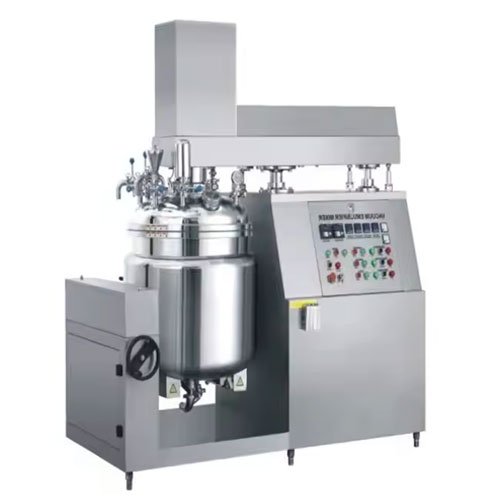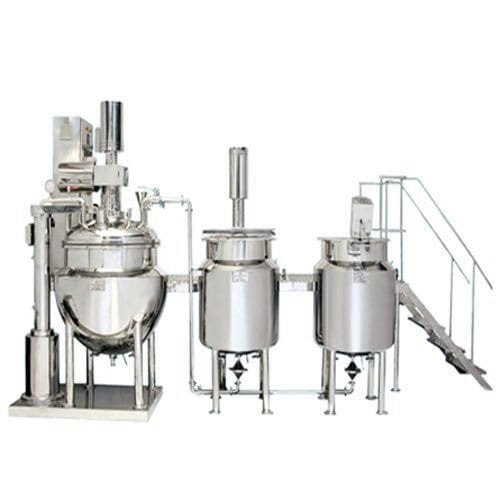A Liquid Syrup Manufacturing Plant is a system designed to streamline the production of liquid formulations like syrups, suspensions, and oral drops. The plant includes multiple units to handle different stages of production such as mixing, filtration, heating, cooling, and storage. It is designed to comply with Good Manufacturing Practices (GMP) and ensures high precision, quality, and hygiene in the manufacturing process.
These plants are widely used for manufacturing:
- Pharmaceutical syrups (antibiotics, cough syrups, etc.)
- Oral suspensions
- Vitamin syrups
- Herbal syrups
- Food-grade syrups like glucose or flavored syrups
Salient Features of Syrup Manufacturing Plant
A modern liquid syrup manufacturing plant comes with a range of advanced features to improve efficiency, minimize human intervention, and maintain product quality. Some of the key features include:
- GMP-compliant design: Ensures hygiene and prevents contamination.
- Compact and modular construction: Saves floor space and allows for easy installation.
- Automated operations: PLC-controlled systems for precision and minimal manual involvement.
- Closed-loop system: Ensures zero contamination during the production process.
- High-shear homogenizers: To achieve uniform mixing and particle size reduction.
- Built-in CIP (Clean-In-Place) system: Simplifies cleaning and maintenance.
- Temperature control systems: For precise heating and cooling of the product.
- Sanitary-grade components: Stainless steel (SS316/SS304) materials to meet regulatory standards.
Working Principle of Syrup Manufacturing Plant
The manufacturing process in a liquid syrup plant typically follows these steps:
- Water Purification: Purified water is prepared in a water treatment plant and stored in a sterile tank for use in the syrup production process.
- Sugar Dissolution: Sugar or similar sweetening agents are dissolved in a jacketed mixing tank with controlled heating.
- Mixing: Active pharmaceutical ingredients (APIs), excipients, and flavors are added to the sugar solution. A high-speed homogenizer ensures proper mixing and emulsification.
- Heating & Cooling: The mixture is heated for sterilization and cooled to the required temperature.
- Filtration: The syrup is passed through filters to remove any impurities or particulate matter.
- Storage: The filtered syrup is stored in a holding tank under sterile conditions.
- Filling & Packaging: The finished product is transferred to an automatic filling machine for bottling and packaging.
Key Equipment and Accessories in a Syrup Manufacturing Plant
A standard liquid syrup manufacturing plant comprises the following equipment and accessories:
- Sugar Melting Vessel: For dissolving sugar under controlled heating.
- Syrup Manufacturing Vessel: The main mixing tank for blending APIs, flavors, and excipients.
- Storage Vessel: For holding the prepared syrup before filtration and packaging.
- Inline Homogenizer: Ensures uniform mixing and particle size reduction.
- Filtration System: Multi-stage filters (sparkler filter, micron filters, etc.) to remove impurities.
- Transfer Pumps: For transferring liquid between different tanks.
- Piping and Valves: Made of sanitary-grade materials to ensure hygienic transfer.
- Heating and Cooling Systems: Jacketed vessels or heat exchangers for temperature control.
- Control Panel: PLC-based system for monitoring and automating the process.
Optional Features of Syrup Manufacturing Plant
For enhanced functionality, syrup manufacturing plants can be customized with the following optional features:
- Vacuum Mixing System: Prevents air entrapment and ensures bubble-free syrup.
- Auto pH Control: Automatically adjusts the pH of the syrup as per formulation requirements.
- Load Cell Weighing System: For accurate ingredient measurement.
- Explosion-proof Design: For handling flammable ingredients.
- SCADA Integration: Advanced monitoring and control of production through SCADA systems.
- Double Filtration: To ensure ultra-pure and contaminant-free syrups.
- De-dusting Systems: Keeps the production area clean and dust-free.
Production Capacities of Syrup Manufacturing Plants
Liquid syrup manufacturing plants are available in a wide range of production capacities to meet the requirements of both small-scale and large-scale manufacturers. Common capacities include:
- Small-scale plants: 50 liters to 500 liters per batch
- Medium-scale plants: 500 liters to 2000 liters per batch
- Large-scale plants: 2000 liters to 10,000 liters per batch
The selection of the production capacity depends on factors such as production volume, market demand, and investment budget. A Liquid Syrup Manufacturing Plant is an essential investment for industries producing liquid formulations. With its advanced features, automation, and modular design, it ensures consistent quality, high efficiency, and GMP compliance. From sugar dissolution to bottling, every stage of the production process is optimized for precision and hygiene.
Whether you are a pharmaceutical company, a food syrup manufacturer, or a nutraceutical brand, choosing the right syrup manufacturing plant tailored to your needs can significantly boost your production capabilities and maintain the highest product standards.









